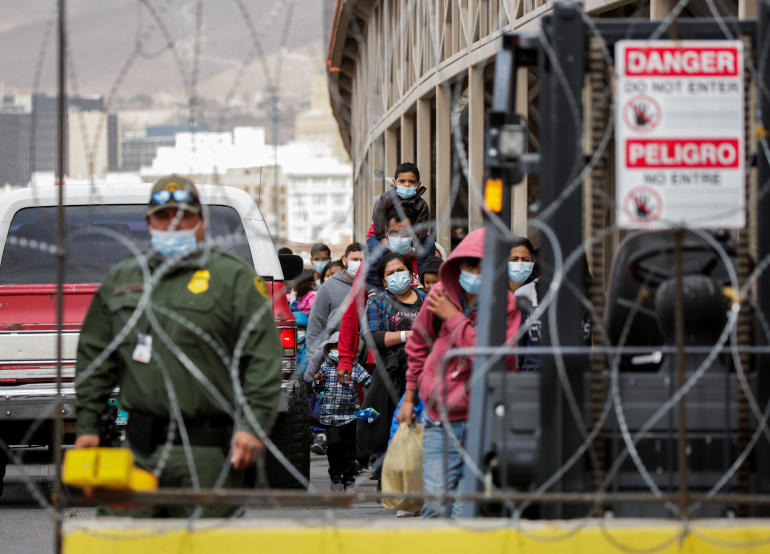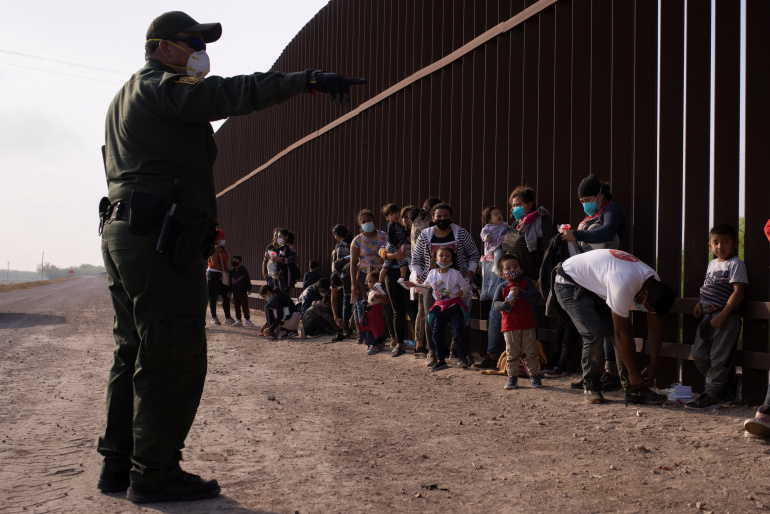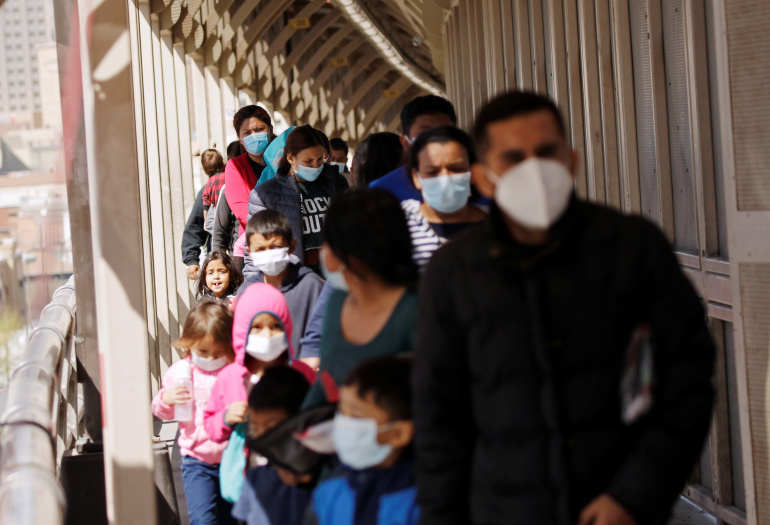Gessale walked up to a crossing along the US-Mexico border in February last year, hoping to file an asylum claim in the United States citing the political persecution he faced in his home country of Ethiopia.
But instead, Gessale, 36, who requested to withhold his real name to protect his identity, was instructed to take the next number in line, 4545, and wait for a phone call. He later found out he was subject to a practice called “metering”, which only allows a limited number of people to apply for asylum at US ports every day.
Usually, migrants get a call within a few weeks. But in March 2020, the coronavirus was declared a global pandemic. The US shut down its southern border and stopped processing asylum requests.
It left Gessale and many others whose numbers stopped moving up in line in limbo, living in Mexican border towns rife with gang violence and exploitation.
“Since then, I have been here, through ups and downs,” Gessale told Al Jazeera. “It’s been mostly horrible.”
The Strauss Center, a University of Texas research group, says there are at least 16,250 asylum seekers (PDF) on nine metering waiting lists. It is unclear exactly how many continue to wait in Mexico. There is also confusion over what will happen to their place in line – or whether they will even have one – if and when the US decides to reopen its borders.
US President Joe Biden took office in January promising to overhaul the US immigration system and restore asylum processing at the US-Mexico border.
On his first day in office, he reversed a legacy of his predecessor Donald Trump called the Migrant Protection Protocols (MPP), a policy that forced asylum seekers to wait for their US court dates in Mexico. Last month, the US began letting in more than 25,000 people with active MPP cases into the US to pursue their claims there.
But the Biden administration has not said when it would fully resume the processing of asylum seekers nor how it will treat those affected by the metering policy.
Immigration advocates say some have been waiting in Mexico longer than those kept from the US by MPP.
Although US authorities at each port of entry decide how many applicants will be considered each day, the management of those lists – depending on the port of entry – is controlled by asylum seekers, Mexican government agencies or non-governmental agencies.
 Central American migrants who have been expelled from the US walking towards Mexico at the Paso del Norte International border bridge, in Ciudad Juarez, Mexico [Jose Luis Gonzalez/Reuters]
Central American migrants who have been expelled from the US walking towards Mexico at the Paso del Norte International border bridge, in Ciudad Juarez, Mexico [Jose Luis Gonzalez/Reuters]
Kennji Kizuka, senior researcher and policy analyst at Human Rights First, a rights group based in Washington, DC, says those waitlists are “a complete mess” and are plagued by “serious issues of corruption and discrimination”.
Most lists are now closed and the majority of adults who show up at US ports asking to make asylum claims are being turned away. Those who attempt to cross the border are subject to “Title 42”, a health rule that Trump enacted last year to quickly expel asylum seekers to Mexico or back to their country of origin.
“For asylum seekers who are waiting in Mexico now, there’s really no way for them to request protection in the US,” Kizuka told Al Jazeera.
“At the moment they’re really stuck in limbo,” Kizuka said.
No legal recourse
The US Customs and Border Protection Agency (CPB) did not comment when asked about the status of migrants who had been subject to metering, saying only people with active MPP cases are currently eligible for entry into the US.
“The United States is continuing to strictly enforce existing immigration laws, as well as COVID-19-related travel and border restrictions,” CBP said in a written response to Al Jazeera.
“Anyone who attempts to cross the border illegally is putting themselves and their families at risk, especially during a global pandemic.”
Metering was first introduced in 2016 under former President Barack Obama to deal with a wave of thousands of Haitians who were arriving at the Tijuana, Mexico border crossing. In 2018, under Trump, the US authorised the use of metering at all entry points through a memorandum, citing a lack of capacity to process migrants. In mid-2019, the waitlists swelled to a high of 26,000.
Although exact statistics are not available, David Bier, an immigration policy analyst at the libertarian Cato Institute says the nationalities of migrants on waitlists largely mirror overall migration flows to the US. The majority are from the Northern Triangle: Guatemala, Honduras and El Salvador, but many are from Haiti, Cuba, as well as several African countries.
 A US Border Patrol agent instructs asylum seekers to line up along the border wall after crossing the Rio Grande River into the US from Mexico in Penitas, Texas, US [Adrees Latif/Reuters]
A US Border Patrol agent instructs asylum seekers to line up along the border wall after crossing the Rio Grande River into the US from Mexico in Penitas, Texas, US [Adrees Latif/Reuters]
Once the US begins reopening its border with Mexico to non-essential travel, Bier adds, asylum processes may be partially reinstated. The current travel ban is in place until April 21.
But those who have been metered, he said, will likely have no way to claim their place in line.
“Metered individuals do not exist in any kind of legal sense in the immigration system in the United States,” Bier told Al Jazeera. “There is no actual underlying regulation or authority for metering or structure for dealing with it.”
Fraught with dangers
Rights groups say the thousands of migrants living in Mexico have been exposed to dangerous living conditions and their presence has created a booming economy for organised criminals who have preyed on them for extortion and ransom.
Since February 2019, according to data collected by Human Rights First, at least 1,544 acts of murder, rape, torture and kidnapping were committed against asylum seekers in Mexico. The group believes this is a vast undercount.
Gessale says Mexican police have extorted him three times. He was forced to give them 500 pesos ($25) each time, more than a week’s food costs. He has also been a target of racist insults and slurs.
 Expelled migrants from Central America walking towards Mexico at the Paso del Norte International border bridge, in Ciudad Juarez, Mexico [Jose Luis Gonzalez/Reuters]
Expelled migrants from Central America walking towards Mexico at the Paso del Norte International border bridge, in Ciudad Juarez, Mexico [Jose Luis Gonzalez/Reuters]
“His economic situation is really dire and when you add the layers of racism that he’s encountering as a Black migrant, it’s hard,” said Robyn Barnard, Gessale’s lawyer who works for Human Rights First.
“He’s been teetering on the edge of complete destitution for a while,” Barnard told Al Jazeera.
Gessale is now fluent in Spanish, but he has no work permit or health insurance in Mexico. In order to make ends meet, he parked and cleaned cars, but that work has since dried up. He closely follows the news and says he was encouraged when Biden won the elections.
“I’m just looking for protection,” he says, citing the political persecution he suffered back in Ethiopia, and now the dangers he encounters in Mexico. “I was hoping that this [US] government was going to change things.”
“It’s very discouraging.”





